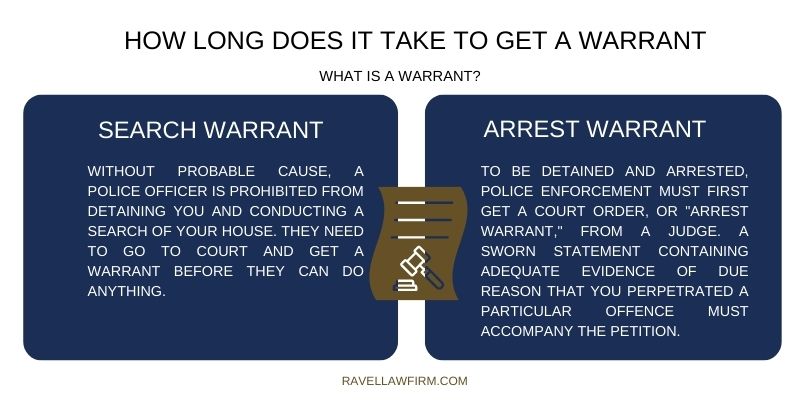The courts in local, country, regional, and supreme courts are the ones who issue warrants. To determine if a suspect has an outstanding warrant, police officers in each state consult a central warrants database. I have discussed below How Long Does It Take to Get a Warrant as it varies in different situations.
Search Warrant
Without probable cause, a police officer is prohibited from detaining you and conducting a search of your house. They must go to court and get a warrant before doing anything. This document allows law enforcement to arrest someone or investigate their property without a warrant, violating the Constitution’s Fourth Amendment protections.
This signifies that the authorities can visit your home, business, or car if they have a search warrant and look for proof. This is not the same as an official order to detain issued by the police.

Arrest Warrant
To be detained and arrested, police enforcement must first get a court order, or “arrest warrant,” from a judge. A sworn statement containing adequate evidence of due reason that you perpetrated a particular offense must accompany the petition.
A search for you and your arrest will begin as soon as an arrest warrant is issued but time varies if you have warrant in another city. If a police officer wasn’t present at the commission of a felony, an outstanding warrant must be obtained. A warrant is not typically required for a person’s arrest if police have reason to believe that person has committed a felony.
Also Read: What Is a Blue Warrant?
How Long Does It Take To Get An Arrest Warrant?
How quickly an officer can get to a court and convince them that a search warrant is essential impacts how long it takes to receive a warrant. An arrest warrant may take months to complete if the cause is complicated or requires considerable research or restoration. Cases that need spectroscopic analysis from the police department or the forensic laboratory typically take the slowest to process.
Arrest Warrant usually takes several hours, but an investigator can speed things up in urgent situations and take as little as a few moments. A search warrant must be executed no later than ten days after it has been issued. Any time between 7 in the morning and ten at night, Monday through Sunday, is acceptable for carrying out a search warrant unless otherwise specified. As a result of their unusual schedules, police officers frequently spend long stretches of their night shifts simply following up on leads.

What if Police have a Search Warrant?
Be sure to study the warrant well if the police arrive and issue one. When only a limited area of the house was requested for inspection, they could not conduct a full search.
They will be on the lookout for evidence connected to a given crime but will take anything unlawful.
Suppose the law enforcement officer investigating your case doesn’t have to rush to get a search warrant, he has to follow law enforcement code of conduct. In that case, it could take many hours before they can examine your premises for evidence that a crime occurred.
It’s preferable to comply if the police show up with a search warrant, even if you’re confident they won’t discover anything illegal. You should hire a trial attorney to represent you in court if they uncover evidence against you.
How can an Attorney help me with an Arrest Warrant?
If you are the focus of an investigation or an arrest warrant has been issued for your name, our office can help in various ways. As soon as possible after being charged with a crime, you should have our legal team begin investigating the case for any key evidence. Such as surveillance footage, witness testimony, or other documents that could prove your innocence. Time has shown to be a poor preserver of emotions and forensic evidence. As part of the booking procedure, we always call the police and ask that they refrain from questioning you.
In most cases, we can alleviate the stress of posting bail by walking you through the options open, such as attending your trial to demand the 10% cash payout in bonds above $25,000. So you don’t have to squander cash with a surety bond’s man that you won’t receive back.
Remember that even if you have an arrest warrant, you are innocent until proven guilty, and we will do everything in our power to protect you. Do not try to reason with the police if you are the focus of an inquiry or have an arrest warrant out for your arrest. Instead, get in touch with a reputable criminal defense attorney immediately for guidance regarding how to proceed.
Check Also: What is a Capias Warrant?
FAQ’s
Is it possible for someone else’s accusations to lead to have a warrant for my arrest?
An arrest can be made based solely on another person’s word, even without any hard evidence. Many of our clients are shocked to learn that their arrest resulted from a victim’s uncorroborated word of mouth. Keep in mind that only probable cause is needed for an arrest warrant. You are not automatically assumed to be guilty. With probable cause, a bare minimum of evidence of a crime being committed is needed.
When an arrest warrant has been issued, would the police inform me of the charges and bond amount?
This question needs a clear-cut solution. It has to be determined on a case-by-case basis. The only kind of arrest warrants that can be checked online in Connecticut is those for re-arrests. The internet does not host any other arrest warrants.
When a warrant for an individual’s arrest is issued, how is the bond determined?
In most cases, a judge will determine the bond amount when he signs an arrest warrant. However, there are cases where the arresting agency determines the bond rather than the judge.

Hi, I’m Brian Gary; I have my Doctor of Juridical Science (SJD) degree from SMU Dedman School of Law in Dallas. Over the years, I have dealt with many families and successful corporate Legal cases. I have counseled many people on legal matters, and along with my profession, I write about Law on my blog. Please feel free to contact me for counseling/case discussion; I’ll be happy to help you.